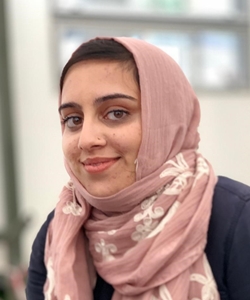 What year did you graduate?
What year did you graduate?
2018
What course did you study?
MSci Biomedical Sciences
What is your current role?
PhD Candidate at King’s College London
How did you get into your current role?
I realised that I thoroughly enjoyed research and the university environment, particularly after doing a summer internship in my third year at an endocrine lab in the University of Pittsburgh, but I was unsure about what kind of research I wanted to pursue. I had gained valuable skills as a possible Bioinformatician in my time at SGUL, especially by having to use R in my final dissertation project and attending the Big Data in Biomedical Science module. After securing a PhD studentship for an MRES/PhD program, I did three rotations in various departments and groups. Having gathered more experience, I chose a lab and proposed my own PhD project of interest about varying states of pluripotency in human induced pluripotent stem cells.
Can you describe a typical day?
Everyday of the week is different. I like to begin my day early (a habit I picked up from my SGUL supervisor) If I do have wet lab experiment to carry out, I prefer to do them in the morning when the communal lab space is not busy. Mostly in the afternoon, I have meetings with the lab group, my supervisor or seminars and workshops to attend.
What do you enjoy about your role?
I like the flexibility of working as a dry lab scientist most and that I can do most of my work from my laptop wherever I like. However, I also like that as a PhD student there are many resources and workshops that one can utilise to learn and develop further as a scientist.
What do you find challenging in your current role?
Although being independent is an asset, it is still a very big jump from the undergraduate level. The fact that you are very much your own entity and have to come up with your own ideas and experiments and then also argue for why they are the right way to go with your project is definitely a challenge.
What advice would you give to a current student at St George’s who is keen to get in to a similar area of work as you?
Persevere, but also adapt. As a PhD student, it is okay not to know everything, but be ready to learn, which means a lot of reading the minutest of details in those journal articles!
Which aspects of your degree are relevant for your current role?
Definitely the final year project, all the science, skills and work gone into working in the lab and learning how to code! There’s one module I also studied that is very under-rated – Learning and Teaching.
What would you say were the best / most challenging things about your degree?
Best: Group tutorials in years one and two – they mimicked very much how problem solving happens in real life and how even now we have some information to solve the bigger picture.
Most challenging: Time management – it is something that I still struggle with to this day! Juggling deadlines, word accounts and exam revision with a social life, home and work.
If you could go back to your time at St George’s, would you do anything differently?
I would get to lectures in Monckton earlier so I wouldn’t have to sit in the overflow lectures.
Do you have any advice or a message for current students at St George’s?
It’s okay not to know what you will do after your degree, but be sure when you do chose something that this is exactly what you want.
Do you have any advice or a message for students considering studying at St George’s?
George’s is great! It is one of the very few Universities where all the resources and centres is located in one campus, which saves so much time! Its smallness is one of its greatest assets.